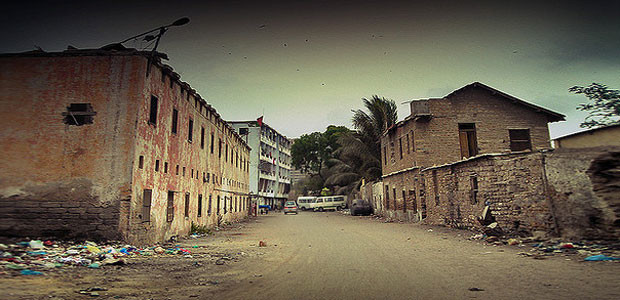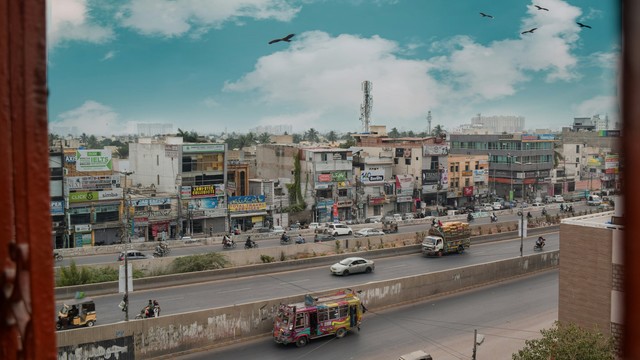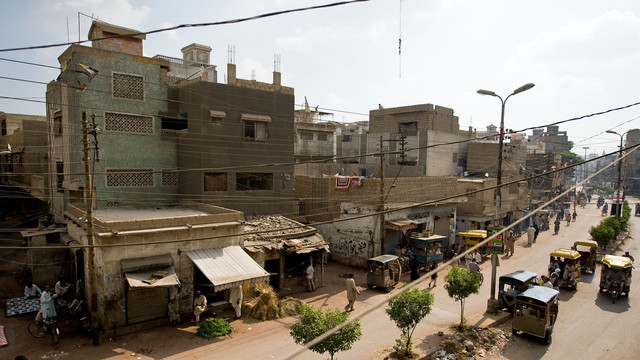Study reveals roots of urban land issues that limit development
Local and international politics can limit the potential for urban centres to deliver benefits to their poorest citizens, even where there are pro-poor policies and market liberalization. So concludes a study, published today by the International Institute for Environment and Development.

Houses built for government officers in the 50s in Karachi, Pakistan. The study found the root causes of inefficient or inequitable development include colonial legacies, modern day politics and financial speculation, which can fuel conflict over land. Photo: Kashiff
The research focused on Karachi, Pakistan whose politics are unique, but its findings are relevant to cities around the world. It showed that the root causes of inefficient or inequitable development include colonial legacies, modern day politics and financial speculation, all of which can fuel conflict over land, and render markets dysfunctional and pro-poor policies irrelevant.
"The development orthodoxy is to seek solutions to urban development challenges in either better government policies or through improved land titling," says architect Arif Hasan, who led the study. "But as this study shows the problems often lie in land contestation, which undermines both markets and the capacity of government agencies to address land issues. The problem is not the lack of laws and regulations for city development, but the conflict over land that makes it difficult for officials to follow them and the procedures they lay down."
The study aimed to identify why Karachi – which is Pakistan’s financial capital – has not achieved its potential. It found that part of the problem is the large number of land-owning agencies whose influence overlaps but whose governance is weak, unclear or ineffective. This has enabled politically motivated land grabs.
"Land is hotly contested because of speculation and real estate development, which bring not only enormous profits but also help Karachi's different ethnic parties consolidate their hold in different areas of the city," says Hasan.
Three important factors compound Karachi’s complex land governance system, in which 13 different land management authorities operate. The first concerns Karachi’s strategic location in the regional conflict related to the Afghan war. The second is its immense economic power in the context of Pakistan in general and in the Sindh province (of which it is the capital) in particular. Third, Karachi’s migrant population far outnumbers its native Sindhi and Balochi speakers. An understanding of these features is necessary to comprehend Karachi’s persistent land management and governance problems.
"In many cities there are struggles over land," says Gordon McGranahan of IIED. "These struggles can make irrelevant any improvement strategies that imagine that land can be managed by a conventional combination of private owners operating in the market and public agencies operating within a bureaucracy."
The study shows that the method of governance in Karachi makes it difficult to implement laws. Bureaucrats and government ministers have discretionary powers over land which they use for patronage purposes. Powerful groups invest their money in the lucrative formal and informal real estate business. And the armed forces and other federal land owning agencies also interfere in land-related matters within the city.
These sorts of messy politics make social and environmental improvements difficult. Meanwhile international development agencies and nongovernmental organisations try to rise above them yet this just makes them irrelevant or subject to manipulation.
"The current status of development in Karachi and many other urban centres is rooted in struggles that cannot be addressed without coming to terms with how local politics play out in each particular place," says Hasan. "A similar mix of land speculation, real estate development, dubious developers, compromised politicians, and ineffective bureaucracies, exist to a lesser or greater extent in most Asian cities and also in cities of industrialised nations. The Karachi study identifies the actors and factors in this process and uses a methodology through which other cities can be viewed."
Gordon McGranahan of IIED adds: "Unless and until cities can overcome such barriers to equitable management of land and finances, poor communities will not have their housing needs met. This will create not create hardship in the present, but will leave a legacy of social and environmental problems for future generations to address."



